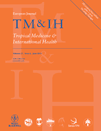
TROPICAL MEDICINE & INTERNATIONAL HEALTH
Scope & Guideline
Uniting voices in the fight against tropical diseases.
Introduction
Aims and Scopes
- Infectious Disease Epidemiology:
The journal publishes significant research on the epidemiology of infectious diseases, including malaria, tuberculosis, HIV/AIDS, and neglected tropical diseases, emphasizing prevention, treatment, and control strategies. - Non-Communicable Diseases (NCDs):
There is a growing focus on non-communicable diseases, their risk factors, and their interaction with infectious diseases, particularly in low- and middle-income countries. - Global Health Policy and Implementation:
Research that evaluates health policies, healthcare delivery systems, and community health interventions in tropical settings is a core area, contributing to evidence-based practice. - Social Determinants of Health:
The journal highlights studies addressing social, economic, and environmental determinants affecting health outcomes, particularly among vulnerable populations. - Innovative Health Technologies:
There is a notable emphasis on the development and evaluation of new health technologies and diagnostic tools to enhance healthcare delivery in resource-limited settings. - Health Systems Strengthening:
Research focusing on health systems strengthening, including the roles of community health workers and the integration of services, is a critical area in the journal.
Trending and Emerging
- Integrated Health Approaches:
Research that integrates infectious diseases with non-communicable diseases and considers social determinants is gaining traction, highlighting the interconnectedness of health issues. - Mental Health and Wellbeing:
There is an increasing emphasis on mental health, particularly in the context of infectious diseases and the impacts of social determinants, reflecting a growing recognition of its importance in overall health. - Digital Health Innovations:
The journal is increasingly publishing studies on digital health technologies and their applications in improving healthcare access and outcomes in low-resource settings. - Climate Change and Health:
Research addressing the impacts of climate change on health, including vector-borne diseases and health system resilience, is emerging as a critical area of focus. - Community Engagement in Health Interventions:
There is a growing trend towards research that emphasizes community involvement and participatory approaches in health interventions, recognizing the importance of local context and stakeholder engagement. - Policy and Implementation Research:
Studies that evaluate the effectiveness of health policies and implementation strategies are increasingly prioritized, aiming to bridge the gap between research and practice.
Declining or Waning
- Traditional Infectious Disease Focus:
As the journal expands its scope to include non-communicable diseases and social determinants, the emphasis on traditional infectious diseases without a broader context has waned. - Single-Disease Studies:
Research that focuses solely on single-disease studies, particularly those not linked to broader health systems or social determinants, has become less prominent compared to integrated approaches. - Epidemiological Studies without Policy Implications:
There is a decrease in studies that do not translate findings into actionable health policies or practices, as the journal increasingly values research that has direct implications for health outcomes. - Research on Established Treatments:
The publication of research focused solely on well-established treatments without exploring innovative or context-specific adaptations has decreased, as the journal seeks to highlight novel approaches.
Similar Journals
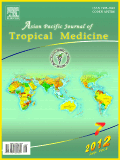
Asian Pacific Journal of Tropical Medicine
Championing open access to crucial tropical medicine findings.Asian Pacific Journal of Tropical Medicine, published by Wolters Kluwer Medknow Publications, stands at the forefront of research in the field of tropical medicine, contributing significantly to the global understanding of health issues prevalent in the Asian Pacific region. With an ISSN of 1995-7645 and an E-ISSN of 2352-4146, this esteemed journal has been an Open Access platform since 2011, ensuring that vital research is accessible to a broad audience. The journal boasts a commendable Scopus rank of 131 out of 636 in the General Medicine category, placing it in the 79th percentile and recognizing its influential contributions to the discipline. Based in Mumbai, India, the journal spans converged years from 2010 to 2024 and is categorized in the Q3 quartile for miscellaneous medicine as of 2023. Researchers, professionals, and students can leverage this journal to stay abreast of the latest findings and developments in tropical medicine, making it an indispensable resource in their academic and professional pursuits.
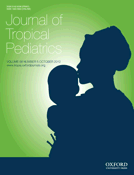
JOURNAL OF TROPICAL PEDIATRICS
Uniting experts to tackle child health challenges globally.JOURNAL OF TROPICAL PEDIATRICS, published by Oxford University Press, stands as a critical platform for the dissemination of research and clinical advancements in the field of tropical pediatrics. With a rich history dating back to 1955, this journal serves as a significant contributor to our understanding of health issues affecting children in tropical and subtropical regions, focusing on infectious diseases, pediatric care, and child health. It currently holds an impressive Q2 ranking in three categories: Infectious Diseases, Medicine (miscellaneous), and Pediatrics, Perinatology and Child Health, placing it among the top journals in its field. Featuring both formative research and applied studies, the journal aims to address the unique challenges posed by pediatric care in tropical environments. Its inclusion in an esteemed database ensures a broad dissemination of critical knowledge to researchers, healthcare professionals, and students alike, promoting a collaborative approach to improving child health outcomes globally.

SAMJ SOUTH AFRICAN MEDICAL JOURNAL
Connecting researchers and practitioners to enhance medical practice.SAMJ South African Medical Journal, an esteemed publication of the South African Medical Association, has been a cornerstone in the field of medical research since its inception in 1945. With a robust impact factor and classified in the Q3 category for Medicine (miscellaneous) as of 2023, the journal has cemented its place among the leading medical journals globally, currently ranking #174 out of 636 in the General Medicine category, representing the 72nd percentile on Scopus. As an Open Access journal since 2003, SAMJ ensures wide dissemination of knowledge, making crucial research readily available to a diverse audience of researchers, healthcare professionals, and students. The journal's commitment to enhancing medical understanding and practice in South Africa and beyond is reflected in its broad scope, which encompasses various domains of medical sciences. With a mission to foster educational discourse and support innovative research, SAMJ is essential for anyone engaged in advancing medical practice and policy.
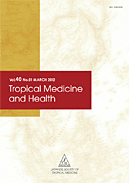
Tropical Medicine and Health
Empowering global health through tropical medicine insights.Tropical Medicine and Health is a prestigious open-access journal published by BMC that serves as a vital platform for researchers and health professionals focusing on the fields of tropical medicine, infectious diseases, and public health. With an ISSN of 1348-8945 and an E-ISSN of 1349-4147, the journal has established itself in the academic community since its inception in 2004, bridging the gap between research and real-world applications in managing tropical diseases. Recognized for its quality, it holds a commendable Q2 ranking in both the Infectious Diseases and Public Health, Environmental and Occupational Health categories, positioned in the 2023 Scopus rankings within the 85th and 74th percentiles, respectively. Researchers can access high-quality, peer-reviewed articles that contribute significantly to advancing knowledge in the field. With a commitment to fostering open scientific dialogue, Tropical Medicine and Health is not just a journal, but a collaborative space for researchers, students, and practitioners working to improve health outcomes in tropical regions worldwide.

Research and Reports in Tropical Medicine
Championing discoveries in tropical health challenges.Research and Reports in Tropical Medicine is a distinguished open-access journal dedicated to advancing knowledge in the field of tropical medicine. Published by DOVE MEDICAL PRESS LTD, this journal operates under the ISSN 1179-7282, facilitating global access to quality research since its inception in 2010. With a commitment to disseminating innovative findings and critical analyses, the journal serves as a vital platform for researchers, professionals, and students engaged in the diverse aspects of tropical diseases and public health challenges. Research and Reports in Tropical Medicine welcomes original research articles, reviews, and case studies that contribute to an improved understanding of health issues in tropical regions, making it an essential resource for those aiming to impact global health positively.

Central European Journal of Public Health
Innovating Solutions for Global Public Health ChallengesThe Central European Journal of Public Health, ISSN 1210-7778 and E-ISSN 1803-1048, is a vital academic forum published by the NATIONAL INSTITUTE OF PUBLIC HEALTH, Czech Republic. With its comprehensive coverage of contemporary issues in public health and medicine since its inception in 1993, this journal aims to bridge the gap between research and practice, fostering a deeper understanding of health dynamics within Central Europe and beyond. As a Q3 ranked journal in both the fields of Medicine (miscellaneous) and Public Health, Environmental and Occupational Health as per 2023 metrics, it provides an accessible platform for innovative studies, policy analyses, and reviews that contribute to the global discourse on public health challenges. Though primarily based in the Czech Republic, it welcomes contributions from a worldwide audience, enhancing its scope and impact. Researchers, practitioners, and students will find invaluable insights that not only enrich academic scholarship but also inform effective public health interventions.
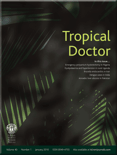
TROPICAL DOCTOR
Connecting health professionals with vital insights.Tropical Doctor is a distinguished academic journal published by SAGE Publications Inc, specializing in the fields of infectious diseases and public health. With a history dating back to 1971, this journal serves as a crucial platform for disseminating research focused on the health challenges and requirements pertinent to tropical and developing regions. Though currently categorized in the fourth quartile in both Infectious Diseases and Public Health, Environmental and Occupational Health, it plays an essential role in fostering dialogue among researchers, health professionals, and policymakers. The journal provides insights into the prevention, treatment, and management of tropical diseases, thus bridging gaps in knowledge that are vital for improving health outcomes. While it does not offer open access, its rigorous peer-review process ensures that only high-quality research is published. As the global landscape of health continues to evolve, Tropical Doctor remains an important resource for those committed to addressing the pressing health issues in tropical regions.

Infectious Diseases of Poverty
Innovating public health strategies for a healthier tomorrow.Infectious Diseases of Poverty, published by BMC, is a leading open-access journal dedicated to addressing the critical intersection of infectious diseases and poverty. Since its inception in 2012, this influential journal has contributed significantly to the fields of public health, infectious diseases, and environmental health. With impressive rankings placing it in the top quartile (Q1) across multiple categories—including Infectious Diseases and Public Health, Environmental and Occupational Health—it stands as a vital resource for researchers and practitioners alike. The journal's commitment to accessibility ensures that high-quality research is available to a global audience, fostering collaboration and knowledge sharing. Based in the UK, Infectious Diseases of Poverty aims to publish innovative research that sheds light on the complexities of infectious diseases and their socio-economic determinants, ultimately working to improve health outcomes in vulnerable populations around the world. With its robust impact factor and esteemed standing within the academic community, this journal serves as an essential platform for advancing the understanding and management of infectious diseases related to poverty.
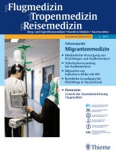
Flugmedizin Tropenmedizin Reisemedizin
Fostering knowledge for safer journeys and healthier lives.Flugmedizin Tropenmedizin Reisemedizin is a prominent journal published by GEORG THIEME VERLAG KG, specializing in the interdisciplinary fields of aviation medicine, tropical medicine, and travel health. With its ISSN 1864-4538 and E-ISSN 1864-175X, this journal serves as a vital resource for healthcare professionals, researchers, and students who are dedicated to enhancing health and safety in the areas influenced by air travel and tropical environments. Although not currently open access, it boasts a rich repository of studies and reviews that address the latest findings and practices in these critical fields. The journal’s commitment to advancing knowledge and clinical practices makes it an essential read for those involved in travel medicine and public health initiatives, fostering an informed community of practitioners ready to tackle emerging global health challenges.

African Health Sciences
Advancing Healthcare Knowledge for a Healthier Africa.African Health Sciences is a pioneering open access journal published by Makerere University, College of Health Sciences, School of Medicine, devoted to fostering the growth of health science research across the African continent. Established in 2001, this journal serves as a vital platform for disseminating groundbreaking studies and advancements in general medicine, ranked #220 out of 636 in the Scopus category of General Medicine, placing it in the 65th percentile, demonstrating its significance in the field. With a Q3 ranking in the Medicine (miscellaneous) category as of 2023, African Health Sciences not only embraces a diverse scope of topics but also plays an essential role in addressing pressing health challenges faced by African populations. Its open access model ensures that critical health information is freely available to researchers, practitioners, and students, promoting collaboration and knowledge-sharing across the region. As we extend our reach through publications until 2024, African Health Sciences continues to represent an invaluable resource for those committed to enhancing healthcare outcomes in Africa.